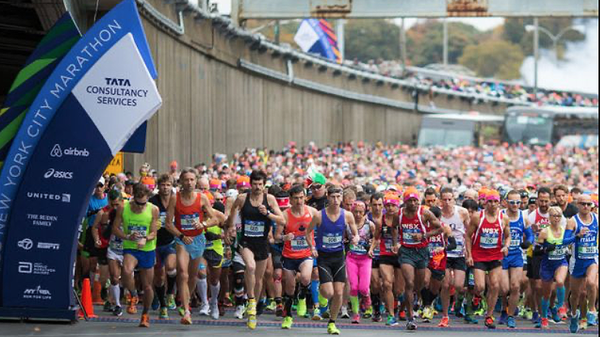

Track and field athletes are widely known to be some of the fittest people on the planet. And it’s true—they need to maintain peak fitness to hit those lightning-fast speeds on the track. Sprinters especially need to be light on their feet, ready to explode into action the moment the gun goes off. But when it comes to marathon runners, the game changes entirely.
ADVERTISEMENT
Article continues below this ad
For them, it’s all about endurance, not raw acceleration. Their focus is on longevity, staying lean and maintaining energy over grueling distances, with many carrying barely any body fat. And that difference in body type and training has sparked a heated debate in Reddit’s Track and Field community.
What’s your perspective on:
Are marathon runners truly healthier, or is our perception of fitness completely skewed?
Have an interesting take?
A user on X named Rachel posted a tweet, remarking that track and field sprinters look like some of the fittest people on the planet. But her remarks about the marathon runners were less than flattering as she compared them to cancer patients. Then, in a completely typical form of communication on the platform, she ended the post abruptly, saying, “There’s a lesson there.”
This attracted a reply from Steve Magness, a track and field writer and coach. He said, “This is interesting because if you look at the data, Olympic distance runners live longer than sprinters. When it comes to longevity, marathoners and vertical jumps do well. Sprints and power athletes not as well. Maybe our perception of what’s healthy is off?” People on Reddit reacted to this, igniting quite a ferocious debate.

Steve Magness who is passionate about mental and physical performance was citing a study conducted by BMS Sports on this issue. After their research, they concluded that Olympic high jumpers and marathon runners live longer than sprinters. The reason? Body structure. Heavier athletes, like sprinters, tend to fare worse in the long run, while lighter athletes—your marathoners and high jumpers—seem to have the edge in longevity, even outlasting the general population.
Now, this sparked quite a debate in the track and field world. Some argue it’s because sprinters don’t keep up with their health after retirement, while marathoners just keep going—no set ‘retirement age’ means they stay fit well into their senior years. Others tossed in the age-old controversy: performance-enhancing substances!
Track and field community debate ferociously on the life span of sprinters and marathon runners
On Reddit, there was a heated discussion in the track community. One user chimed in with, “I wonder why though, is it possibly PEDS or lifestyle following retirement?” They thought this was a valid argument, drawing parallels to rowing, where competitors seem to live 100+ years. They added, “Power and sprinting athletes also have higher instances of PED use than distance athletes; I wonder if this plays a role. I love the point Steve made; I’m just curious on the why!”
PEDs have been a thorny issue in track and field for years. Big names like Justin Gatlin, Yohan Blake, and even Shelly-Ann Fraser-Pryce have faced suspensions tied to PED use. And these substances aren’t just career-enders; they’ve been linked to early deaths too. A study in the Journal of Medicine even found that men who use PEDs have a higher risk of early death and diseases, which could explain some of the mortality issues among sprinters. But hey, it’s not like marathoners are squeaky clean either—there have been cases of PED use in long-distance running too. So, this theory isn’t without its holes.
ADVERTISEMENT
Article continues below this ad

Another user jumped in, saying, “The problem isn’t active sprinters/distance runners affecting these numbers. It’s retired athletes. People don’t typically continue to train sprints for the rest of their lives after their peak. I don’t know a single-distance runner from college that doesn’t still run (even if it’s just a few miles a week). Lifelong healthy habits outweigh being super fit for 5-10 years.” Marathoners, like Fauja Singh, who ran a marathon at the ripe age of 89, just keep running well into old age. Meanwhile, sprinters usually hang up their spikes by 40, and without that routine, some slide into sedentary lifestyles.
ADVERTISEMENT
Article continues below this ad
Another user agreed, adding, “Also, the most obvious discrepancy to me is that you can’t casually sprint after you retire, whereas distance running continues to be a part of most distance athletes lives throughout their retirement, leading to unhealthy habits for sprinters and being much more sedentary.” Unlike marathons, which welcome runners of all ages, sprinting is a young person’s game. To stay competitive, you need elite-level fitness and speed, so once that starts to fade, so does the routine—leading to more couch time and fewer laps.
And one hit back with, “When is the last time you saw an obese marathoner?” It makes sense that marathoners, running long distances even in their golden years, have to stay fit to keep going. So they keep things lean, while sprinters who retire early could fall out of their fitness routines. Reflecting on this debate, what do you think? Is long-term fitness really the key to marathoners outliving sprinters, or is there more to the story?
ADVERTISEMENT
ADVERTISEMENT
ADVERTISEMENT
ADVERTISEMENT


Are marathon runners truly healthier, or is our perception of fitness completely skewed?